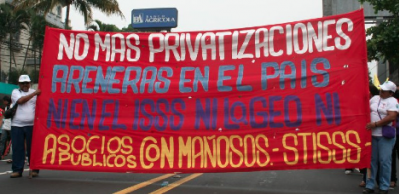 P3 Legislation in El Salvador: An Aggressive Reassertion of Neoliberal Economics?
P3 Legislation in El Salvador: An Aggressive Reassertion of Neoliberal Economics?[ED NOTES:IM GOING TO JUST CITE A FEW EXCERPTS HERE DUE TO LENGTH...
Over the past several weeks, El Salvador has begun to restructure its port and electricity services as the first consequence of the newly enacted Ley de Asocio Público-Privados (Public-Private Partnership Law; P3), which took effect in El Salvador on June 16 after legislative approval on May 23. A history of unsuccessful privatization measures in El Salvador indicates that this economic policy will threaten many Salvadorans while doing little to promote genuinely productive economic activity in the region. In fact, the law is evidently aimed more at opening new markets and increasing profits for large foreign corporations than improving the lives of average Salvadoran citizens. However, P3 not only achieved unanimous approval in the Salvadoran legislature after merely two days of discussion, but did so with the support of President Mauricio Funes of the Farabundo Marti Liberation Front (FMLN). The implementation of this anachronistic neoliberal policy by a president whose party, the FMLN, had previously opposed privatization not only underlines a consistently unproductive relationship between the United States and El Salvador, but also reveals much about the internal tensions of the FMLN party that may have significant implications for the upcoming 2014 Salvadoran presidential elections. Background The new P3 measure was drafted as a joint effort between the ruling Funes Administration, Washington, the International Monetary Fund (IMF), and the World Bank (WB) in the name of efficiency and economic development. Foreign Pressures As evident in the Bajo Lempa statement, Salvadoran social organizations are not oblivious to the foreign roots of this policy. Washington’s promotion of P3 has been blunt and unrelenting. The United States and the IMF have used financial conditionality to promote the interests of large multinational corporations, directing their influence in El Salvador through two specific U.S. programs: the Partnership for Growth (PFG) and the Millennium Challenge Corporation (MCC).
U.S. financial involvement in El
Salvador has been channeled through the work of development programs
created by President Barack Obama and former President George W. Bush.
P3 was created as a derivative of the PFG program, a bilateral
development program established by President Obama and extended to El
Salvador after Obama’s 2011 visit to the country. The program seeks to
create an environment that is friendly to U.S. business and has
identified security issues and a lack of tradable goods as the primary
barriers to this goal. Through PFG, El Salvador receives development
funding when it implements policies that promote the interests of
foreign corporations. Similarly, the MCC, a USAID project created by the
Bush Administration, focuses on infrastructure, education, and business
development, and has complemented PFG funding in El Salvador. Between
2007 and 2012, the MCC invested $463 million USD in a new highway
spanning the northern border of the country. The next round of funding
has been allocated towards developing the Pacific coast of El Salvador.
[18]Initially, encouragement from these
programs was not enough to quell the concerns of protestors, and the
Funes administration was reluctant to bring privatization initiatives to
the legislature. Thus, early in 2013, the IMF urged President Funes to
organize a national dialogue to address the issue of public debt and
heavily recommended privatizing public goods and services as a solution.
When there was no indication of P3 legislation moving forward in a
timely manner, the U.S. ambassador to El Salvador, Mari Carmen Aponte,
responded to fierce local opposition from social organizations by
publicly threatening to withhold the pending second round of MCC funding
unless P3 was passed. [19]
[ed notes;click link for whole piece,then afterwards also see... U.S. Intervention in El Salvador, by Privatization This Time http://www.labornotes.org/blogs/2013/01/us-intervention-el-salvador-privatization-time
U.S.
Intervention in El Salvador, by Privatization This Time - See more at:
http://www.labornotes.org/blogs/2013/01/us-intervention-el-salvador-privatization-time#sthash.4aOivMet.dpufEL SALVADOR RIGHT WING DESTABILIZATION THWARTED BY SOCIAL MOVEMENTS,FOR NOW...



No comments:
Post a Comment